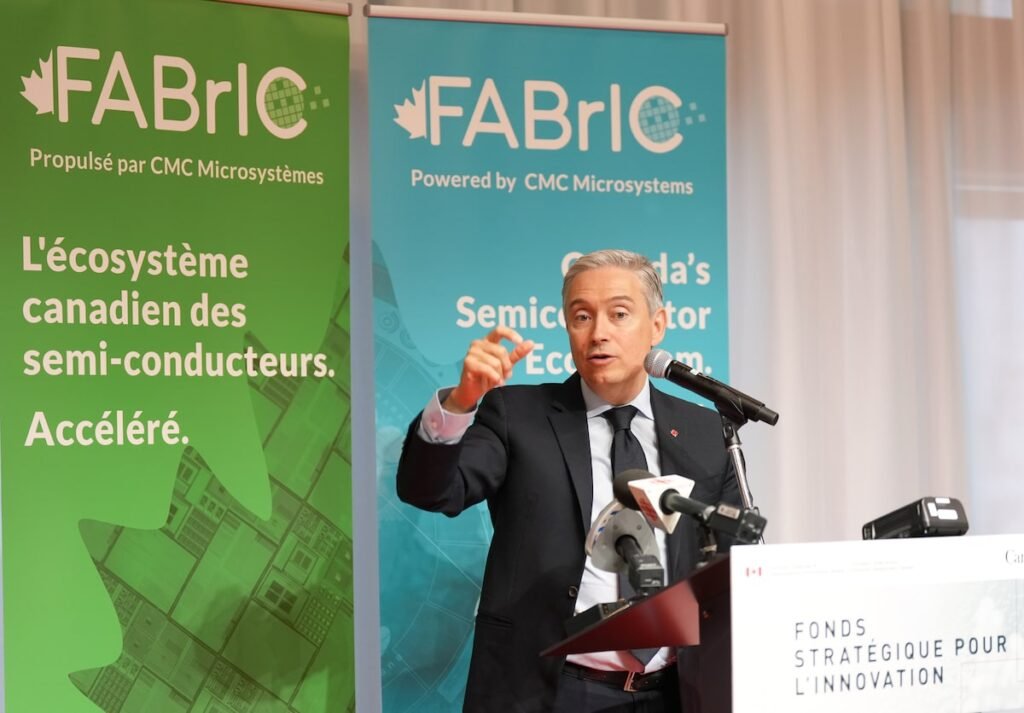François-Philippe Champagne, Minister of Innovation, Science and Industry, made the announcement regarding semiconductor manufacturing and distribution in Montreal on July 4th.Christine Musi/The Canadian Press
The federal government is investing $120 million in an effort to revitalize Canada’s semiconductor industry, which faces stiff competition from new critical technologies and major spending in the global economy.
The investment, made through Industry Canada’s Strategic Innovation Fund, was announced by Industry Minister François-Philippe Champagne in Montreal on Thursday morning. The investment will support Manufacturing Integrated Components for the Internet Edge (FABrIC), a five-year initiative aimed at stimulating chip businesses and training students.
It’s the latest element of Canada’s strategy to expand its semiconductor value chain at a time when developments in artificial intelligence, clean technology and electric vehicles are driving demand for advanced semiconductors and geopolitical tensions are rising over Taiwan, the world’s leading chip manufacturer.
Meanwhile, CMC Microsystems, the Canadian nonprofit behind the effort, has expanded into the United States to sell the service to private companies, and says it will move to a for-profit model in Canada if government funding is stopped in the future.
Founded in 1984, CMC supports Canada’s semiconductor industry by purchasing expensive tools and manufacturing processes and sharing the costs between start-ups and academic institutions that they could not afford alone, as well as providing engineering expertise and skills training.
Semiconductors are the physical components that control the flow of electrical current in microchips and are essential in nearly all electronic devices, from LED lightbulbs and mixers to EVs and rockets.
Of the $120 million from Ottawa, $63 million will be allocated through a third-party governance committee as grants to Canadian companies partnering with CMC, $37 million will be used to develop new “fab” processes at existing manufacturing facilities in Canada, and $20 million will go toward tooling and training for universities.
Gordon Harling, president and CEO of CMC, first proposed the FABrIC initiative in 2021. While the U.S. introduced the CHIPS Act in 2022, spending most of its $53 billion in funding on building chip manufacturing plants, FABrIC would instead focus investments on building skills in specialized areas such as photonics, quantum technology and microelectromechanical systems (MEMS).
“We’ve chosen geographies that have long life spans, high growth rates and are very unique, where we believe we can dominate globally,” Harling said.
The funding is contingent on CMC raising $40 million from provinces to boost business grants, and Harling said he is already in talks with Ontario, Quebec, Alberta, British Columbia and Nova Scotia to secure the support.
CMC operates in 16 other countries and recently launched in the United States, joining the country’s proposal and receiving funding from the CHIP Act. CMC’s services in the U.S. are subsidized by the government, so American companies pay five to 10 times as much as Canadian companies.
The CMC has already attracted attention from U.S. startup companies and could support hundreds of research groups through the Purdue-led project, Harling said.
Harling said that while there’s a chance of “big money,” CMC will continue to operate as a nonprofit in Canada as long as the government provides subsidies. But if that support is cut, the group will have to consider a for-profit model to become self-sustaining. The group got a glimpse of that possibility last year when CMC lost funding from another group, the Canadian Foundation for Innovation.
“We get paid for our work and use that to cover expenses outside of FABrIC, and the money flows to benefit Canada,” Harling said. “We do this behind the scenes so that next time all our funding disappears, we can survive and keep our staff.”
He said all funding from the Canadian government is managed separately from CMC’s international operations, ensuring that Canadian taxpayer money is only being used for domestic startups.
Among the Canadian companies CMC has backed early on is Lanovus, a maker of advanced silicon chips. Lanovus Chief Executive Hamid Arabzadeh called the nonprofit the “glue” of Canada’s chip ecosystem and said the funding will help train employees and benefit later-stage Canadian chip companies.

